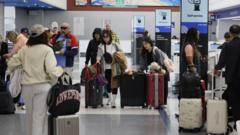As millions of Americans gear up for Thanksgiving travel, an "arctic outbreak" is poised to affect large portions of the eastern United States. The National Weather Service (NWS) warns of severe weather, particularly in the northern Plains, coinciding with some of the busiest travel days of the year. Forecasts predict significant snowfall along the Colorado Rockies, with accumulations exceeding 10 inches (25 cm) expected by Wednesday, and a storm system poised to exacerbate conditions as it moves eastward for Thanksgiving Day.
Bitterly cold temperatures are also on the horizon, potentially plummeting to between -30F to -40F (-34C to -40C) in the northern Plains and Upper Midwest, according to BBC meteorologist Matt Taylor. This extreme weather will likely extend into the Midwest, delivering lake-effect snow and thunderstorms, particularly impacting areas in interior New England and the Appalachians. Notable snow showers are expected along the northern coastline of Michigan, with NWS anticipating between 4-8 inches of snowfall.
As travelers rush to get to their destinations, the Transportation Security Administration (TSA) has reported record-high passenger volumes for this Thanksgiving period. The busiest travel days are predicted to be Tuesday and Wednesday leading into the holiday, with about nine million passengers to be screened at airports. Furthermore, nearly 72 million Americans are expected to take to the roads for trips exceeding 50 miles (80 km), largely due to decreased gasoline prices compared to last year.
Although airports have generally avoided significant disruptions thus far, the expected inclement weather could lead to severe travel challenges, especially along major highways such as I-90 between Cleveland and Buffalo and I-81 north of Syracuse, where snowfall accumulation poses risks. This anticipated precipitation follows a winter storm in California that delivered heavy snow, alongside wind gusts reaching 50 mph (81 km/h). Central California recently faced another atmospheric river event while communities in the Pacific Northwest continue recovering from the aftermath of last week’s bomb cyclone that caused widespread flooding and power outages.
With adverse weather conditions on the horizon, travelers are urged to stay informed and prepared as they navigate potentially treacherous roads and delayed flights during this holiday season.
Bitterly cold temperatures are also on the horizon, potentially plummeting to between -30F to -40F (-34C to -40C) in the northern Plains and Upper Midwest, according to BBC meteorologist Matt Taylor. This extreme weather will likely extend into the Midwest, delivering lake-effect snow and thunderstorms, particularly impacting areas in interior New England and the Appalachians. Notable snow showers are expected along the northern coastline of Michigan, with NWS anticipating between 4-8 inches of snowfall.
As travelers rush to get to their destinations, the Transportation Security Administration (TSA) has reported record-high passenger volumes for this Thanksgiving period. The busiest travel days are predicted to be Tuesday and Wednesday leading into the holiday, with about nine million passengers to be screened at airports. Furthermore, nearly 72 million Americans are expected to take to the roads for trips exceeding 50 miles (80 km), largely due to decreased gasoline prices compared to last year.
Although airports have generally avoided significant disruptions thus far, the expected inclement weather could lead to severe travel challenges, especially along major highways such as I-90 between Cleveland and Buffalo and I-81 north of Syracuse, where snowfall accumulation poses risks. This anticipated precipitation follows a winter storm in California that delivered heavy snow, alongside wind gusts reaching 50 mph (81 km/h). Central California recently faced another atmospheric river event while communities in the Pacific Northwest continue recovering from the aftermath of last week’s bomb cyclone that caused widespread flooding and power outages.
With adverse weather conditions on the horizon, travelers are urged to stay informed and prepared as they navigate potentially treacherous roads and delayed flights during this holiday season.




















